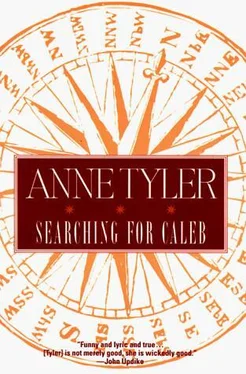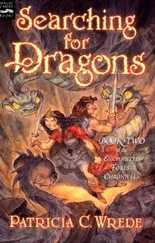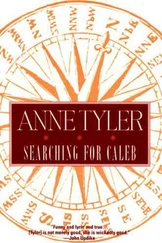Anne Tyler - Searching for Caleb
Здесь есть возможность читать онлайн «Anne Tyler - Searching for Caleb» весь текст электронной книги совершенно бесплатно (целиком полную версию без сокращений). В некоторых случаях можно слушать аудио, скачать через торрент в формате fb2 и присутствует краткое содержание. Жанр: Современная проза, на английском языке. Описание произведения, (предисловие) а так же отзывы посетителей доступны на портале библиотеки ЛибКат.
- Название:Searching for Caleb
- Автор:
- Жанр:
- Год:неизвестен
- ISBN:нет данных
- Рейтинг книги:5 / 5. Голосов: 1
-
Избранное:Добавить в избранное
- Отзывы:
-
Ваша оценка:
- 100
- 1
- 2
- 3
- 4
- 5
Searching for Caleb: краткое содержание, описание и аннотация
Предлагаем к чтению аннотацию, описание, краткое содержание или предисловие (зависит от того, что написал сам автор книги «Searching for Caleb»). Если вы не нашли необходимую информацию о книге — напишите в комментариях, мы постараемся отыскать её.
Searching for Caleb — читать онлайн бесплатно полную книгу (весь текст) целиком
Ниже представлен текст книги, разбитый по страницам. Система сохранения места последней прочитанной страницы, позволяет с удобством читать онлайн бесплатно книгу «Searching for Caleb», без необходимости каждый раз заново искать на чём Вы остановились. Поставьте закладку, и сможете в любой момент перейти на страницу, на которой закончили чтение.
Интервал:
Закладка:
"Duncan doesn't like comic books," Justine said.
Out in the field, Duncan raised a sprocket wheel in one gaunt, blackened hand and waved it at her.
"And Meg, she's all grown up? She doesn't come on visits with you now?"
"She doesn't come anywhere with us," Justine said sadly. "She studies a lot. She works very hard. She's very conscientious. Other girls wear blue jeans but Meg sews herself these shirtwaist dresses and polishes her shoes every Sunday night and washes her hair every Monday and Thursday. I don't think she approves of us. To tell the truth, Alonzo, I don't believe she thinks much of carnivals either or fortune telling or moving around the way we do. Not that she says so. She's very good about it, really, she's so quiet and she does whatever we tell her to. It kills me to see her bend her head the way she sometimes does."
"Girls are difficult," Alonzo said. "Fortunately I never had many of them."
"I think she's in love with a minister."
"With a what?"
"Well, an assistant minister, actually."
"But even so," said Alonzo.
"She went to his church in Semple. She's religious, too. Did I mention that? She went to his young people's group on Sunday evenings. Then they started going out together to lectures and debates and educational slide shows-oh, very proper, but she's only seventeen! And she brought him to our house so we could meet him. It was terrible. We all sat in the living room. Duncan says she has a right to choose whoever she wants but he doesn't think she chose this man, she just accepted him. Like a compromise. What else could it be, with a man so meek and puny? He's one of those people with white shiny skin and five o'clock shadow. Duncan says-"
"But after all," said Alonzo, "better that than a motordrome rider. My first wife's girl married a motordrome rider."
"I would prefer a motordrome rider any day," Justine said. Then she sighed. "Oh well, I suppose nobody likes who their children go out with."
"It's true."
"When I was courting, my father locked me in my room one time."
"Oh?" said Alonzo. He squinted, following the arc of the baseball floating across the sun.
"I fell in love with my first cousin."
"Oh-ho."
"On top of that, my shiftless first cousin. He drank and ran around. For years he had a girlfriend named Glorietta, who always wore red. My aunts and my mother would whisper whenever they mentioned her, even her name.
Glorietta de Merino."
"Ah, Glorietta," said Alonzo, and settled back with his face tilted to the sky and his boots stretched out in front of him. "Go on."
"He made terrible grades all through school and dropped out the first year of college. Nobody could ever find him when they wanted him. While
// I was an only child. I tried to be as good as possible. Would you believe, until I was twenty years old I had never tasted liverwurst?"
"Liverwurst," said Alonzo, turning it over lazily.
"Because my family didn't happen to eat it. Not that there was anything wrong with it, of course, they just weren't in the habit of ordering it from the market. I didn't know there was such a thing as liverwurst! The first time I tasted it I ate a whole pound. But that was later. First I fell in love with my cousin, and went on trips with him and rode in his unsafe car and had to be locked in my room. Then I discovered liverwurst."
"But what became of him?" Alonzo asked.
"Who?"
"The first cousin."
"Oh," said Justine. "Why, I married him. Who did you think I was talking about?"
"Duncan?"
"Of course Duncan," said Justine, and she sat up again and shaded her eyes. "Cousin Duncan the Bad," she said, and laughed, and even Alonzo, drowsy and heavy in the sun, had to see how happy she looked when she located Duncan's spiky gold head glinting above the weeds.
4
Duncan and Justine Peck shared a great-grandfather named Justine Montague Peck, a sharp-eyed, humorless man who became very rich importing coffee, sugar, and guano during the last quarter of the nineteenth century. On any summer day in the 1870's, say, you could find him seated in the old Merchants' Exchange on Gay Street, smoking one of his long black cigars to ward off yellow fever, waiting for news of his ships to be relayed from the lookout tower on Federal Hill. Where he originally came from was uncertain, but the richer he grew the less it mattered. Although he was never welcomed into Baltimore society, which was narrow and ossified even then, he was treated with respect and men often asked his advice on financial issues. Once there was even a short street named after him, but it was changed later on to commemorate a politician.
When Justin Peck was fifty years old, he bought a sycamore-shaded lot in what was then the northern part of town. He built a gaunt house bristling with chimneys and lined with dark, oily wood. He filled it with golden oak furniture and Oriental screens, chandeliers dripping crystal, wine velvet loveseats with buttons and more buttons up and down their backs, heavy paintings leaning out from the walls, curlicued urns, doilies, statuary, bric-a-brac, great globular lamps centered on tasseled scarves, and Persian rugs laid catty-corner and overlapping. Then he married Sarah Cantleigh, the sixteen-year-old daughter of another importer. Nothing is known of their courtship, if there was one, but her wedding portrait still looms in a Baltimore dining room: a child-faced girl with a look of reluctance, of hanging back, which is accentuated by the dress style of the day with its backward-swept lines and the flounce at the rear of the skirt.
In 1880, only nine months after the wedding, Sarah Cantleigh died giving birth to Daniel. In 1881 Justin Peck remarried, this time into stronger stock-a German cutler's daughter named Laura Baum, who rescued Daniel from the old freedwoman who had been tending him. Laura Baum's portrait was never painted, but she lived long enough to be known personally even by Meg, her great-great-step-grandchild. She was a sallow, straight-backed woman who wore her hair in a knot. Although she was twenty when she married, observers said she looked more like forty. But then she looked forty when she died, too, at the age of ninety-seven. And it was clear that she made an excellent mother for little Daniel. She taught him to read and cipher when he was only three years old, and she made certain that his manners were impeccable. When Justin suggested that she stop taking Daniel with her on visits to her father she agreed instantly, even ceasing her own visits although Justin had not asked that of her in so many words. (Her father was very obviously a foreigner, an undignified little man given to practical jokes. His dusty jumbled shop by the harbor was a hangout for seamen and other rough types.) "Always remember, Daniel," she said, straightening his collar, "that you must live up to your family's name." She never explained what she meant by that. Her darkies broke into hissing laughter on the kitchen stairs and asked each other in whispers, "What family? What name? Peck?" but she never heard them.
In 1885, Laura had a son of her own. They called him Caleb. He was blond like his half brother, but his tilted brown eyes must have snuck in from the Baum side of the family, and he had his Grandpa Baum's delight in noise and crowds. Even as a baby, being wheeled along in his caramel-colored wicker carriage, he would go into fits of glee at the sight of passing strangers. He liked anything musical- church bells, hurdy-gurdies, the chants of the street vendors selling hot crabcakes. When he was a little older he took to the streets himself, riding an iron velocipede with a carpeted seat. He and Daniel were confined to the sidewalk in front of their house, but while Daniel obeyed instructions, leafing through The Youth's Companion on the front steps with his chick-yellow head bent low, Caleb would sooner or later be tugged southward by the fire bell or the gathering of a crowd or, of course, the sound of a street musician. He followed the blind harpist and the banjoist, the walking piano that cranked out Italian tunes and the lady who sang "The Pardon Came Too Late." Then someone would think to ask, "Where's Caleb?" His mother came out on the front steps, a fan of creases rising up between her eyebrows. "Daniel, have you seen Caleb?"
Читать дальшеИнтервал:
Закладка:
Похожие книги на «Searching for Caleb»
Представляем Вашему вниманию похожие книги на «Searching for Caleb» списком для выбора. Мы отобрали схожую по названию и смыслу литературу в надежде предоставить читателям больше вариантов отыскать новые, интересные, ещё непрочитанные произведения.
Обсуждение, отзывы о книге «Searching for Caleb» и просто собственные мнения читателей. Оставьте ваши комментарии, напишите, что Вы думаете о произведении, его смысле или главных героях. Укажите что конкретно понравилось, а что нет, и почему Вы так считаете.












